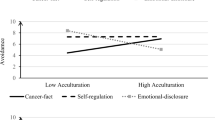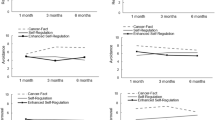Abstract
Purpose
Little is known about the psychological well-being and social barriers among immigrant Chinese American breast cancer survivors. The aim of the present study was to explore the social needs and challenges of Chinese American immigrant breast cancer survivors.
Method
This study used the expressive writing approach to explore the experiences among 27 Chinese American breast cancer survivors. The participants were recruited through community-based organizations in Southern California, most of whom were diagnosed at stages I and II (33 and 48%, respectively). Participants, on average, had been living in the USA for 19 years. Participants were asked to write three 20-min essays related to their experience with breast cancer (in 3 weeks). Participants’ writings were coded with line-by-line analysis, and categories and themes were generated.
Results
Emotion suppression, self-stigma, and perceived stigma about being a breast cancer survivor were reflected in the writings. Interpersonally, participants indicated their reluctance to disclose cancer diagnosis to family and friends and concerns about fulfilling multiple roles. Some of them also mentioned barriers of communicating with their husbands. Related to life in the USA, participants felt unfamiliar with the healthcare system and encountered language barriers.
Conclusion
Counseling services addressing concerns about stigma and communication among family members may benefit patients’ adjustments. Tailor-made information in Chinese about diagnosis and treatment for breast cancer and health insurance in the USA may also help patients go through the course of recovery.
Similar content being viewed by others
References
Siegel R, Ma J, Zou Z, Jemal A. Cancer statistics, 2014. CA Cancer J Clin. 2014;64(1):9–29. doi:10.3322/caac.21208.
Liu L, Zhang J, Wu AH, Pike MC, Deapen D. Invasive breast cancer incidence trends by detailed race/ethnicity and age. Int J Cancer. 2012;130(2):395–404. doi:10.1002/ijc.26004.
Thewes B, Butow P, Girgis A, Pendlebury S. The psychosocial needs of breast cancer survivors: a qualitative study of the shared and unique needs of younger versus older survivors. Psycho-Oncology. 2004;13(3):177–89. doi:10.1002/pon.710.
Ashing-Giwa KT, Padilla G, Tejero J, Kagawa-Singer M. Understanding the breast cancer experience of Asian American women. Psycho-Oncology. 2003;12:38–58.
Ashing-Giwa KT, Lim JW. Predicting physical quality of life among a multiethnic sample of breast cancer survivors. Qual Life Res. 2010;19(6):789–802. doi:10.1007/s11136-010-9642-4.
Wen KY, Fang CY, Ma GX. Breast cancer experience and survivorship among Asian Americans: a systematic review. J Cancer Surviv. 2014;8(1):94–107. doi:10.1007/s11764-013-0320-8.
Hoeffel EM, Rastogi S, Kim MO, Hasan S, United States Bureau of the Census. The Asian population: 2010. Suitland: US Department of Commerce, Economics and Statistics Administration, US Census Bureau; 2012. Available at https://www.census.gov/library/publications/2012/dec/c2010br-11.html.
Ashing KT, Padilla G, Tejero J, Kagawa-Singer M. Understanding the breast cancer experience of Asian American women. Psycho-Oncology. 2003;12(1):38–58. doi:10.1200/JCO.2004.06.030.
Chen YC. Chinese values, health and nursing. J Adv Nurs. 2001;36(2):270–3. doi:10.1046/j.1365-2648.2001.01968.x.
Lee S, Chen L, Ma GX, Fang CY, Oh Y, Scully L. Challenges and needs of Chinese and Korean American breast cancer survivors: in-depth interviews. N Am J Med Sci. 2013;6(1):1–8. doi:10.7156/najms.2013.0601001.
Lim J-W, Gonzalez P, Wang-Letzkus MF, Ashing-Giwa KT. Understanding the cultural health belief model influencing health behaviors and health-related quality of life between Latina and Asian-American breast cancer survivors. Support Care Cancer. 2009;17(9):1137–47. doi:10.1007/s00520-008-0547-5.
Gibson MA. Immigrant adaptation and patterns of acculturation. Hum Dev. 2001;44(1):19–23. doi:10.1159/000057037.
Tsai TI, Morisky DE, Kagawa-Singer M, Ashing-Giwa KT. Acculturation in the adaptation of Chinese-American women to breast cancer: a mixed-method approach. J Clin Nurs. 2011;20(23–24):3383–93. doi:10.1111/j.1365-2702.2011.03872.x.
Wong-Kim E, Sun A, Merighi JR, Chow EA. Understanding quality-of-life issues in Chinese women with breast cancer: a qualitative investigation. Cancer Control. 2005;12(Suppl 2):6–12.
You J, Lu Q. Sources of social support and adjustment among Chinese cancer survivors: gender and age differences. Support Care Cancer. 2014;22(3):697–704. doi:10.1007/s00520-013-2024-z.
Wellisch DK, Kagawa-Singer M, Reid SL, Lin YJ, Nishikawa-Lee S, Wellisch M. An exploratory study of social support: a cross-cultural comparison of Chinese-, Japanese-, and Anglo-American breast cancer patients. Psycho-Oncology. 1999;8(3):207–19.
Kagawa-Singer M, Wellisch DK, Durvasula R. Impact of breast cancer on Asian American and Anglo American women. Cult Med Psychiatry. 1997;21(4):449–80. doi:10.1023/A:1005314602587.
Quach T, Nuru-Jeter A, Morris P, Allen L, Shema SJ, Winters JK, et al. Experiences and perceptions of medical discrimination among a multiethnic sample of breast cancer patients in the Greater San Francisco Bay Area, California. Am J Public Health. 2012;102(5):1027–34. doi:10.2105/AJPH.2011.300554.
Sue DW, Sue D. Counseling the culturally diverse: theory and practice. Hoboken: Wiley; 2012.
Lu Q, Yeung NC, You J, Dai J. Using expressive writing to explore thoughts and beliefs about cancer and treatment among Chinese American immigrant breast cancer survivors. Psycho-Oncology. 2015; doi:10.1002/pon.3991.
Lu Q, Zheng D, Young L, Kagawa-Singer M, Loh A. A pilot study of expressive writing intervention among Chinese speaking breast cancer survivors. Health Psychol. 2012;31(5):548–51. doi:10.1037/a0026834.
Lu Q, Wong CCY, Gallagher MW, Tou RYW, Young L, Loh A. Expressive writing among chinese american breast cancer survivors: a randomized controlled trial. Health Psychol. 2017;36(4):370–379. doi:10.1037/hea0000449.
Giorgi A. The theory, practice, and evaluation of the phenomenological method as a qualitative research procedure. J Phenomenol Psychol. 1997;28(2):235–60. doi:10.1163/156916297X00103.
Goffman E. Stigma: notes on the management of spoiled identity. Harmondsworth: Penguin Books; 1963.
Else-Quest NM, LoConte NK, Schiller JH, Hyde JS. Perceived stigma, self-blame, and adjustment among lung, breast and prostate cancer patients. Psychol Health. 2009;24:949–64.
Andersen BL, Farrar WB, Golden-Kreutz DM, Glaser R, Emery CF, Crespin TR, et al. Psychological, behavioral, and immune changes after a psychological intervention: a clinical trial. J Clin Oncol. 2004;22:3570–80.
Epping-Jordan JE, Compas BE, Osowiecki DM, Oppedisano G, Gerhardt C, Primo K, et al. Psychological adjustment in breast cancer: processes of emotional distress. Health Psychol. 1999;18:315–26.
Bond MH. Emotions and their expression in Chinese culture. J Nonverbal Behav. 1993;17(4):245–62. doi:10.1007/BF00987240.
Gabrenya WKJ, Hwang KK. Chinese social interaction: harmony and hierarchy on the good earth. In: Bond MH, editor. The Handbook of Chinese Psychology. Hong Kong: Oxford University Press; 1996. p. 309–21.
Ho DYF. Filial piety and its psychological consequences. In: Bond MH, editor. The Handbook of Chinese Psychology Hong Kong. Oxford: Oxford University Press; 1996. p. 155–65.
Kagawa-Singer M, Wellisch DK. Breast cancer patients’ perceptions of their husbands’ support in a cross-cultural context. Psycho-Oncology. 2003;12(1):24–37. doi:10.1002/pon.619.
Peters-Golden H. Breast cancer: varied perceptions of social support in the illness experience. Soc Sci Med. 1982;16:483–91. doi:10.1016/0277-9536(82)90057-0.
Fredette SL. Breast cancer survivors: concerns and coping. Cancer Nurs. 1995;18:35–46.
Crandall CS, Moriarty D. Physical illness stigma and social rejection. Br J Soc Psychol. 1995;34(8):67–83. doi:10.1080/08870440802074664.
Chapple A, Ziebland S, McPherson A. Stigma, shame and blame experienced by patients with lung cancer: qualitative study. Br Med J. 2004;328:1470–4. doi:10.1136/bmj.38111.639734.7C.
Lam WWT, Fielding R. The evolving experience of illness for Chinese women with breast cancer: a qualitative study. Psycho-Oncology. 2003;12(2):127–40. doi:10.1002/pon.621.
Kim HS, Sherman DK, Taylor SE. Culture and social support. Am Psychol. 2008;63(6):518–26. doi:10.1037/0003-066X.
Chen WT. Predictors of breast examination practices of Chinese immigrants. Cancer Nurs. 2009;32(1):64–72. doi:10.1097/01.NCC.0000343366.21495.c1.
Lu Q, You J, Man J, Loh A, Young L. Evaluating a culturally tailored peer mentoring and education pilot intervention among Chinese breast cancer survivors using a mixed methods approach. Oncol Nurs Forum. 2014;41(6):629–37.
Acknowledgements
This study was supported by the American Cancer Society MRSGT-10-011-01-CPPB (PI: Qian Lu).
Author information
Authors and Affiliations
Corresponding author
Ethics declarations
Conflict of Interest
The authors declare that they have no conflict of interest.
Ethical Approval
All procedures performed in the study involving human participants were in accordance with the ethical standards of the institutional research committee, and the authors’ institutional ethics committee approved the study.
Informed Consent
Informed consent was obtained from all individual participants included in the expressive writing parent study.
Funding
This study was supported by the American Cancer Society MRSGT-10-011-01-CPPB (PI: Qian Lu).
Rights and permissions
About this article
Cite this article
Warmoth, K., Cheung, B., You, J. et al. Exploring the Social Needs and Challenges of Chinese American Immigrant Breast Cancer Survivors: a Qualitative Study Using an Expressive Writing Approach. Int.J. Behav. Med. 24, 827–835 (2017). https://doi.org/10.1007/s12529-017-9661-4
Published:
Issue Date:
DOI: https://doi.org/10.1007/s12529-017-9661-4




